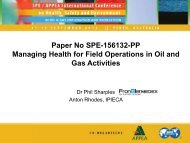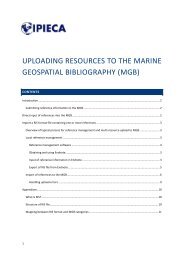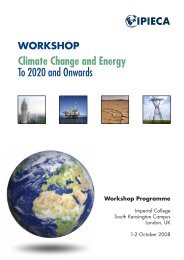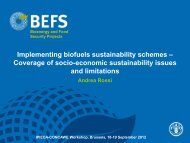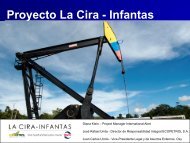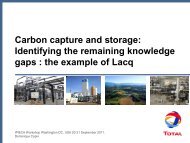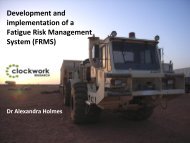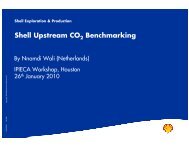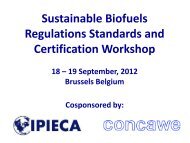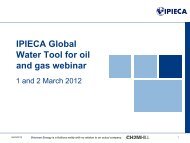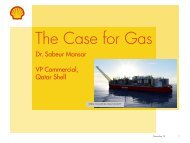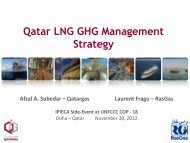WSSD Report FINAL! - OGP
WSSD Report FINAL! - OGP
WSSD Report FINAL! - OGP
Create successful ePaper yourself
Turn your PDF publications into a flip-book with our unique Google optimized e-Paper software.
THE OIL AND GAS INDUSTRY FROM RIO TO JOHANNESBURG AND BEYOND<br />
Climate change<br />
Greenhouse gas emission reductions, 1990–2001<br />
emission reduction: million tonnes CO 2 equivalent<br />
100<br />
90<br />
80<br />
70<br />
BP’s greenhouse gas<br />
emissions trading<br />
system supported<br />
its commitment<br />
towards reducing<br />
emissions which<br />
have been falling<br />
steadily since 1998.<br />
60<br />
50<br />
1990 (base) 1998 1999 2000<br />
2001<br />
This compressor is<br />
used in Nexen’s<br />
heavy oil operations<br />
in Canada to<br />
capture previously<br />
flared or vented<br />
methane.<br />
Installation of these<br />
units has reduced<br />
Nexen’s greenhouse<br />
gas emissions by<br />
upwards of 1 million<br />
tonnes of CO 2<br />
equivalent per year.<br />
collection of wellhead casing and tank vent methane<br />
emissions that were previously released directly to<br />
the atmosphere or flared. The gas that is collected is<br />
tied to the sales gas system, further enhancing the<br />
attractiveness of reducing these emissions. Nexen<br />
supports a number of research and development<br />
projects that are focused on understanding the technical<br />
issues and capacity in the Western Canada<br />
Sedimentary Basin associated with geological sequestration<br />
of CO 2<br />
.<br />
Internationally, Nexen has been active in evaluating<br />
CDM investments related to production and<br />
exploration activities in Yemen, Nigeria and Colombia,<br />
three of the company’s core countries. Nexen has<br />
looked beyond the oil and gas sector, evaluated many<br />
investments and became a partner in the Belize Rio<br />
Bravo carbon sequestration project coordinated by<br />
The Nature Conservancy.<br />
The second yearly compliance period has passed<br />
and more than seven million tonnes of carbon dioxide<br />
equivalent have been traded since start-up. The trading<br />
system has provided a robust framework for the business<br />
units within the company to manage and reduce their<br />
emissions, and has enabled the business to incorporate<br />
the financial impacts of GHG emissions into project<br />
planning processes. Employees have been given the<br />
challenge to look for innovative ways to reduce GHG<br />
emissions in their operations, and this approach has<br />
already identified unexpected economic opportunities.<br />
BP’s internal experience will now underpin its<br />
participation in external emissions trading systems.<br />
Work is focused on the development of credit based<br />
trading mechanisms to complement the existing GHG<br />
reduction tools.<br />
Going to market internally<br />
BP launched the first ever global corporate GHG<br />
emissions trading system in January 2000. This<br />
tool was implemented to assist delivery of the<br />
company’s GHG reduction commitments cost-effectively.<br />
Each of the company’s business units has been<br />
given yearly emission allocation caps and must meet<br />
them by abatement of their emissions through<br />
project implementation, or by trading through the<br />
intranet-based trading system.<br />
Improving efficiency<br />
through cogeneration<br />
Among the more promising approaches to<br />
addressing the risks of climate change are those<br />
that rely upon economically attractive actions and<br />
advanced technology. One good example is the<br />
increasing use of cogeneration units at major industrial<br />
facilities such as petroleum refineries and<br />
chemical plants.<br />
This means that a fuel, usually natural gas, is used<br />
directly in a large power turbine that generates elec-<br />
24



